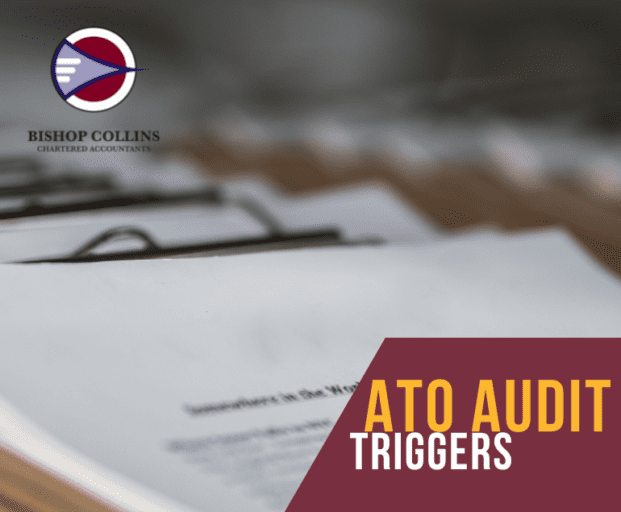What Triggers an ATO Audit?
Hearing the words “ATO Audit” often evokes one of two reactions; either the burying-of-heads-in-the-sand or a call to action.
As an accountant, I can say with some authority that taxpayers who are proactive about their tax returns are in a much better position to handle an ATO Audit, and are most likely to avoid an ATO audit altogether. The reason for this is to do with what has been included or excluded in your tax return; for example, attempting to reduce taxes by not correctly including income or incorrectly overclaiming deductions can trigger an ATO Audit. Remember, as the taxpayer you are responsible for what is lodged in your return – not your accountant or tax agent, you.

The list of ATO audit triggers is endless, and indeed we have looked at this topic previously, however, I would like to look in detail at just one of the major ATO audit triggers: data-matching and ATO prefilling. Here’s some top tips for you to take note on what triggers an ATO audit!
ATO Data Matching
The ATO is ramping up its data matching activities, big time. They’re tapping into more and more sources every year.
Single Touch Payroll
The ATO brought in Single Touch Payroll (STP) a few years back and are just beginning to tap into potential ATO audit trigger points. This data provides your payroll information to the ATO progressively for every pay throughout the year.
- Superannuation compliance has already begun with the ATO cross checking super payments with STP data. So it is very important to pay your super on time. I have already had clients receive automated letters here suggesting they may have incorrectly paid super and to lodge a superannuation guarantee charge (SGC) statement imposing crippling penalties on businesses for mistakes or only slightly late payments.
- Centrelink: cross-checking your income estimates and amounts reported to Centrelink can be done on a live basis now.
- Business activity statements (BAS): PAYG withholding incorrectly reported on BAS can be reviewed, and easily cross-checked by the ATO.
Lifestyle Assets
The ATO is continuing to expand previous data-matching activities such as the 2020 “Lifestyle assets data-matching program”. This program has been gathering information from insurance providers and state governments in relation to boats, cars, art, horses and aircraft, to name a few things. This program has a few triggers affecting almost every possible tax:
- Income tax: If you are accumulating lifestyle assets and your income isn’t sufficient then the ATO will come knocking.
- GST: If you are claiming GST on lifestyle assets without being a legitimate business then you could be a target.
- FBT (Fringe Benefits Tax): If lifestyle assets are being claimed in businesses but are being used personally then this could trigger an FBT audit.
- CGT (Capital Gains Tax): If lifestyle assets are disposed of then the ATO will check your return for CGT being reported. You can still be liable for CGT on personal use assets if the acquisition cost of an asset is more than $10,000.
Cryptocurrency
The ATO has recently brought to focus an extension on their Cryptocurrency data-matching program. The ATO collects information from major exchanges and any crypto-designated service provider. The primary triggers are as follows:
- CGT: Since crypto is mostly treated as a capital asset the ATO will be looking for CGT being reported on your return if you have sold crypto in an income year.
- Income tax: In some circumstances, you can receive income from carrying out a “business” of trading crypto currency. The quantity and the process of trading can mean the ATO can require you to report this as ordinary income.
- FBT: If businesses use crypto and are passing it on to an employee or associate, you could be staring down the barrel of a 47% fringe benefit tax by using business money to purchase crypto in your individual name.
Property Income
This is a new data-matching program that the ATO has announced which involves collecting data from real estate property management software. Rental properties are being brought to the fore as the ATO has recently announced a high error rate from rental property audits conducted in recent years. 1.6million taxpayers will be affected by this program. People often choose Rental Properties as investments to reduce income tax. This may be the case when negatively geared, however, not reporting rental income and expenses correctly can cost you.
This new program will add to the rental bond data-matching program already being conducted. The ATO will be looking at:
- Income tax: Ensuring that all rental income and deductions have been included in the return.
- CGT: Ensuring that any disposals have been recorded on a taxpayers individual return.
- Lodgment: Ensuring that taxpayers are lodging returns when there is rental income.
Novated Leases
Another new data matching program through which the ATO is gaining information from major leasing providers. Possible triggers for this program are:
- Income tax: If you are claiming Car Expenses in your tax return to reduce taxes and have a novated lease, these expenses are not claimable in your return because they should already be claimed by your employer.
- GST: Businesses claiming GST credit for the purchase of a car when it is a novated lease is incorrect, only the GST on the repayment is claimable.
- FBT: Businesses could find themselves in an FBT audit if they have not been reporting FBT but have entered into a novated lease agreement with their employees.
Benchmarking
The ATO is continuing to cross check business income against other taxpayers in their industry. This reviews your major claims such as cost of sales, motor vehicles, and labour can trigger an ATO Audit which generally looks at the inclusion of cash in your income. The ATO has been known to issue default assessments if you have not kept adequate records. They basically assume you have earned a certain amount of income based on industry benchmarks and what information they have from other parties. Not including your cash income is not the way to reduce small business taxes legally. Watch out for the common expression “is it cheaper if I pay cash?”
Late Lodgement
The ATO is always cross checking late lodgements with higher-risk taxpayers, and they are always looking for businesses and individuals that aren’t lodging tax returns on time. If you think you can get away with not lodging a tax return, think again; not only are the late lodgement penalties severe, you may also find yourself under the microscope since late lodging is like waving a red flag to a bull.
ATO Prefilling is Not Perfect
You need to avoid being complacent and blindly relying on ATO prefill data. Yes, it is reasonably accurate in many circumstances, however, it is there often as a reminder that attention needs to be given to report this income correctly. If the ATO doesn’t have something in their prefill then don’t stick your head in the sand and assume that you don’t need to declare it. For example, if your prefill doesn’t include some share investment income and you know you have share investments, then do your homework and cross-check that each tax statement has been included in the correct location on your return.
If the ATO gets it wrong then you need to be proactive and make sure that the data source is corrected. Just ignoring what the ATO has reported on their pre-filling can mean bigger penalties if the ATO audits you later and you chose to ignore income that the ATO had already included. You can find some more information straight from the horse’s mouth here.

Speak to Bishop Collins about Tax and Auditing
It’s simple; with Bishop Collins Accountants on the NSW Central Coast, there are no surprises. We listen. We educate. We deliver. We provide solutions to protect your assets, and assist you with minimising your tax and moving toward your goals.
To learn how Bishop Collins can help you with taxes and auditing, visit bishopcollins.com.au or call (02) 4353 2333.







